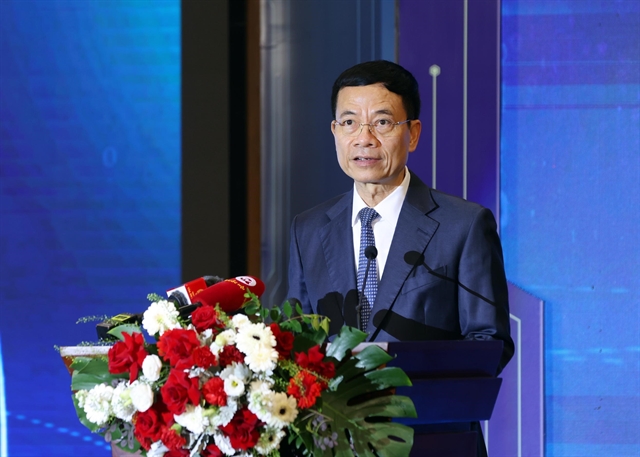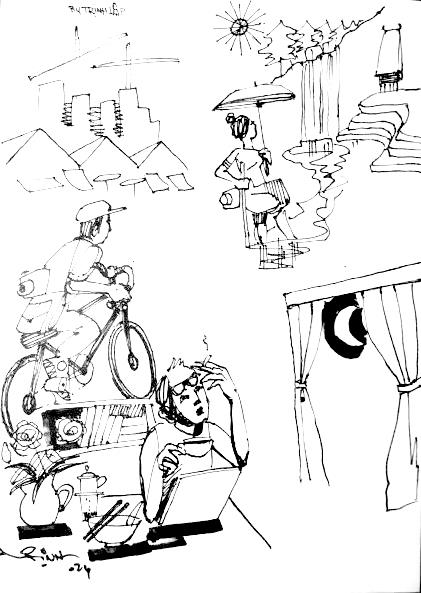 Society
Society

 |
| Illustration by Trịnh Lập |
by Nguyễn Mỹ Hà
We journalists need to be always reminded about our job, duty and responsibility -- how it is important to report with reliable sources and quotations, do research and dig deeper into the archives to back our argument. Perhaps the most important part of our job is the ability to listen to people, to understand why and how they arrive at where they are.
Journalists today have many supporting tools to write the news, get photos, and source information, but how a journalist uses those materials to craft a piece of news or a feature story depends on the fact-based reporting skills they have.
Over the past few weeks, a much discussed news item was the wandering Buddhist monk Thích Minh Tuệ.
He told people on social media he just wanted to follow the Buddha's teaching, have one vegan meal donated by well-wishers a day, and to sew his own garments from discarded fabric found on his wanderings.
He has been walking and living like this for six years. Some people met him on the road, recorded his words and shared his perspectives on how he wanted to lead his life as a monk, practising the hardest, most frugal lifestyle while trying to obtain an enlightened mind.
As news about him went viral, many people started to follow suit. People who make an income on social media started following him everywhere he went, recording every move he made.
His privacy was seriously invaded, as he didn't have a home as such, and everything happened outdoors. His journey became phenomenal, with many people following him. His entourage swelled up and blocked traffic, and when he wanted to stay the night in a cemetery, the group was so large it would disturb the peace.
Many devout Buddhists say they worship him, calling him a living Buddha. People of other faiths, such as some Catholic priests, publicly showed their respects to him. Buddhists of Vietnamese origins living elsewhere in the world came to Việt Nam to join his walk, and one even died from physical exhaustion in the heat. For a monk, it may have been a blessing to perish on a spiritual quest, but for others it is more complicated. The Vietnamese believe living people have a duty to give the monk a proper burial after his death.
If Minh Tuệ was a leading torch to finding true faith, he should have been a source of unity rather than division.
Many people questioned his sincerity and authenticity in practising Buddhism, suggesting it was due to some personal emotional pain that could not be healed. The way he addressed himself as "con," the pronoun parents use on children, showed his choice to lower himself in rank to everyone he talked to.
Some say that if everyone decides to walk the street and ask for just a bowl of rice a day, then who will go out to the fields to plant rice.
The practice of wandering monks has a tradition in the Buddhism of India and other countries in Southeast Asia, Việt Nam included. Prior to Minh Tuệ other monks also wandered the streets, living off the donations of Buddhist followers.
Buddhism is not about the Buddha giving favours to his followers. It's about each person looking deep into their minds to unlock themselves of greed and jealousy, and finding compassion to free themselves from attachment.
During the few weeks that he was popular on social media, the police found out Minh Tuệ didn't have a Social Security number, so he was issued one.
There are religious ceremonies on becoming a Buddhist monk. You have to pass these rituals otherwise, no matter how hard you try to live your life, you won't progress in meditation and attain the level of awareness one needs.
In the traditional way of news reporting, you'd have to go to a place and speak to the subject of interest to get what you deem the truth. Today, if every news outlet sent in a reporter asking the subject the same question over again, it'd be a waste of time.
Today, social media streamers, TikTokers and YouTubers won't leave any stone unturned to get an interview and to have an image of Minh Tuệ on their channel. Some went to Minh Tuệ's parents' house and were able to politely speak with them.
We learned that he once had to get his parent's written permission to go into a pagoda. His father said that he had to submit VNĐ10 million for his son to be accepted as a novice monk.
"I told him it was a hard life to choose. If he really wanted to do it, then he had to keep faith, as there would be no return. Think it over," his father said.
Minh Tuệ's father, 85, is in good health and speaks at ease with a moderate voice, not showing much emotion, but lots of wisdom, wit and intelligence. He said he gave his son a whole afternoon to think it over before he signed the paper.
"He left his home, left his phone. Then he bought his parents a new fridge and left for the pagoda," the father said.
When someone asked his mother if she worried about her son, she said, "No. When I saw him on TV, we were glad that he was healthy. We want him to keep doing what he wants to."
An ordinary person would, perhaps, want to have his or her children living close to them, but Minh Tuệ's mother is definitely not like that, but she still cares about him deeply.
"Until I die, I'll never stop taking him as my son," she said.
Many middle-aged women recently clad themselves in designer clothes with patchwork resembling the monk's robe, and rudely rushed into Minh Tuệ's parents' house, posing and having their pictures taken. The parents were kind and polite to greet them all, as Minh Tuệ told them to open their doors as they were sent by karma.
The people intruding into the lives of the elderly parents in their 80s received negative comments by most who saw it.
And as a journalist, not being there is definitely a better approach than rushing to the house and trying to get them to talk to you for what you may think is an "exclusive interview."
Sometimes keeping distance gives you more room, time and hindsight to observe a situation and ponder its reasons and consequences more deeply.
Always remember to check your facts and quotes, and ask yourself: "How do I know if this is true?" VNS




